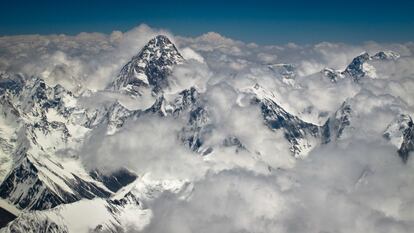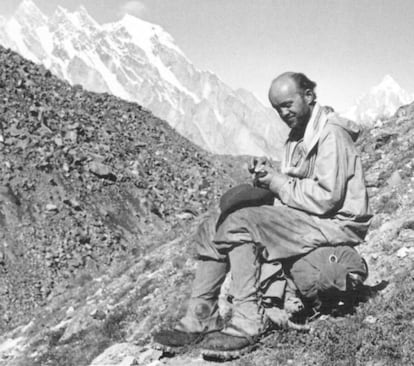Betrayal, pain and death on K2
A renowned climber was accused of abandoning a teammate while another was forced to fend for himself overnight on the world’s second highest mountain

Now that K2 (28,251 ft / 8,611m) is regularly summited by high-altitude tourists, it is hard to imagine the remarkable stories of bravery, betrayal and pain that happened on the world’s second-highest mountain in 1939, and again in 1954. As Nazi Germany set out to conquer Europe, Fritz Wiessner, a German-American chemist and mountaineer became obsessed with K2. On July 19, 1939, it was starting to get dark when Wiessner and fellow climber, Pasang Lama, were less than 800 feet (240 meters) from the top. They weren’t using oxygen tanks, but the weather was perfect. They still had plenty of energy and only a few easy stretches ahead to reach the summit. But Pasang, afraid of the demons that come out at night, refused to attempt the summit until daylight. Wiessner agreed to turn around – a decision he would regret for the rest of his life as a life-changing series of calamities unfolded on the way down.
A 1938 US expedition to reconnoiter the mountain and plan the best ascent route up the Abruzzi Spur was followed by another US expedition in 1939 to conquer K2. The German-born Wiessner was an accomplished climber and mountaineer who had become a naturalized US citizen a few years prior to the 1939 expedition. Wiessner passed on the know-how gained over many years climbing the European Alps to local climbers, and decided to lead a US team to summit K2. Since the expedition lacked a sponsor, each climber paid his own way, which meant that wealthy adventurers claimed many of the spots on the team. Wiessner set out to lead an expedition comprised of rich clients instead of the most skilled American mountaineers of the day. One of his clients was a well-heeled man named Dudley Wolfe, enthusiastic and willing, but completely unprepared for the rigorous climb ahead. The hike to the base camp on the giant of the Karakoram mountain range giant lasted a month. These days, it only takes a week. Once established, the supply chain of provisions, fuel, and other equipment to the numerous high-altitude camps above the base camp worked reasonably well. Until everything fell apart for reasons that are still murky today.
In the early days, local Sherpas were responsible for supplying the high-altitude camps and providing support in case of a storm. Nowadays, the Sherpas have a more prominent role, and this year they set the ropes for a record 200 summits in a single season, more than half of all the summits for the previous 68 years. But in 1939, the Western climbers were in charge. When leader Fritz Wiessner reached a point on K2 from which he could launch an assault on the summit, the expedition support machinery below ground to a halt. The Sherpas transporting supplies between the camps stopped coming. Either the wrong orders were given, or the Sherpas misunderstood them. The life-supporting umbilical cord connecting the camps had been severed, isolating the unsuspecting Wiessner, Lama and Wolfe, while the camps below were systematically dismantled.
Ironically, a logistical problem during the successful 1954 Italian ascent of K2 also resulted in one of the most unpleasant episodes in the history of Himalayan climbing. When young Walter Bonatti and a porter named Amir Mehdi arrived at the agreed location with vital supplies and oxygen tanks, climbers Lino Lacedelli and Achille Compagnoni weren’t there. They had pitched the tent higher up and Bonatti struggled to find them in the dimming light. When he finally spotted the tent, the two climbers screamed at him to leave the supplies and head back down the mountain – there was no room in the tent for them. Unable to descend in the dark, Bonatti and Mahdi endured a terrible night out in the open at 26,000 feet (8,000 meters). Mahdi lost all his fingers and toes from severe frostbite, but survived with Bonatti’s help. The young Italian climber went on to fame for his pioneering and technically difficult climbs, but he never forgot the cruel betrayal on K2. The confidentiality contract signed by Bonatti when he joined the expedition prevented him from denouncing Lacedelli and Compagnoni, but years later he told the truth and also proved that they both used oxygen on the K2 conquest, despite their claims to the contrary. Years passed before Bonatti’s version of the facts was accepted as accurate.

There was no second chance at the summit for Fritz Wiessner. Pasang Lama had lost his crampons and could not continue the climb. They began their descent and were surprised to find Dudley Wolfe, who had been waiting for a week, alone in a camp at 25,000 feet (7,700 meters). Wolfe was in a desperate state after having nothing to eat or drink for days. Hoping to find supplies and Sherpas at the next camp a thousand feet below, Wiessner and Pasang left Wolfe to seek help. But the two men kept descending without seeing any people or camps until, more dead than alive, they finally made it to the base camp. Then the accusations began. Wiessner accused Tony Cromwell, another expedition member, of trying to kill him, while Cromwell blamed Wiessner for abandoning Wolfe. Three attempts were launched to rescue Wolfe, but the last team of Sherpas that went out to look for him disappeared. Wolfe’s body has never been found.
Back in the United States, Wiessner was widely reviled for the tragic incident. Years later, he told his account of the missing camps in a 1956 book. After Wiessner’s death in 1988, Jack Durrance, another member of the expedition, confirmed that Cromwell ordered the dismantling of the high-altitude camps, but had instructed the Sherpas to leave the camps above 23,000 feet (7,000 meters) in place. Fritz Wiessner never forgot the moment when he unknowingly turned his back on history and decided not to summit K2, so sure that the dawn would bring him the glory that was instead stolen away by the night demons.
Tu suscripción se está usando en otro dispositivo
¿Quieres añadir otro usuario a tu suscripción?
Si continúas leyendo en este dispositivo, no se podrá leer en el otro.
FlechaTu suscripción se está usando en otro dispositivo y solo puedes acceder a EL PAÍS desde un dispositivo a la vez.
Si quieres compartir tu cuenta, cambia tu suscripción a la modalidad Premium, así podrás añadir otro usuario. Cada uno accederá con su propia cuenta de email, lo que os permitirá personalizar vuestra experiencia en EL PAÍS.
¿Tienes una suscripción de empresa? Accede aquí para contratar más cuentas.
En el caso de no saber quién está usando tu cuenta, te recomendamos cambiar tu contraseña aquí.
Si decides continuar compartiendo tu cuenta, este mensaje se mostrará en tu dispositivo y en el de la otra persona que está usando tu cuenta de forma indefinida, afectando a tu experiencia de lectura. Puedes consultar aquí los términos y condiciones de la suscripción digital.









































